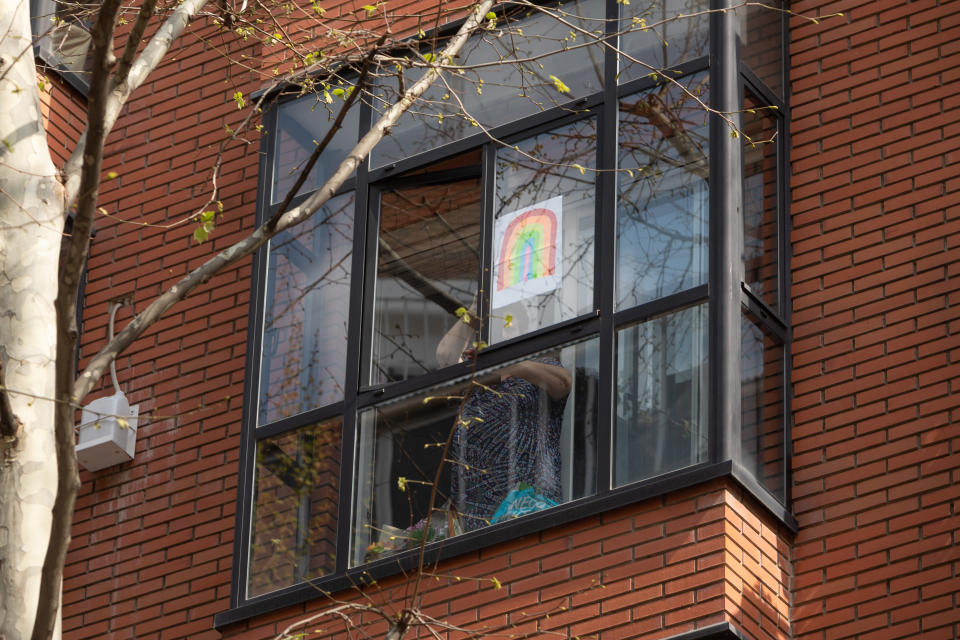5 ways to help other people during the coronavirus crisis while you're stuck inside

Many people are self-isolating at home as the coronavirus spreads — 300,000 global cases and counting — and stuck inside, you could feel stressed out or helpless while reading social media posts or the news.
Government orders have forced the immediate closures of school districts and companies, leaving some unemployed and others who work in “essential” businesses (grocery stores, banks and medicine) to continue working, despite risks to their own health. Meanwhile, online images of people ignoring local and state mandates to practice social distancing have sparked concerns that the virus won’t be contained anytime soon.
Although it feels bleak, there are tiny ways to help others and feel better from the comfort of home.
Join @VancityReynolds in helping encourage wish kids waiting for their wish by sharing a message of hope. Just post your creative message of hope, tag @MakeAWish, #WishesAreWaiting + 2 friends to join in! Learn more about how you can spread more hope: https://t.co/q5Wt3uPrEN. pic.twitter.com/wvtxj2Dkls
— Make-A-Wish America (@MakeAWish) March 20, 2020
Use the #WishesAreWaiting hashtag to bring hope to critically ill children.
The Make-A-Wish Foundation of America, a non-profit that makes fantastic things happen for critically ill or terminal children, grants a wish every 34 minutes. But since the coronavirus pandemic, 970 wishes — plus an estimated 30 each day — have been delayed partly because 77 percent involve travel. Therefore, the group can no longer send children on vacations, to meet their role models or to fulfill their dream jobs.
On Friday, the foundation launched the “Messages of Hope” program, a simple way to inspire children waiting for their wishes. You can write a message, film a silly video or take a fun photo to encourage kids to continue wishing, then post it on social media tagging @MakeAWish and the hashtag #WishesAreWaiting. Or make a donation that contributes to future wishes.
Ryan Reynolds tweeted the first one, joking in a video message, “I know that 99.99 percent of your wishes weren’t to meet me at all — they were probably to meet The Rock...” of his Red Notice co-star adding, “Maybe this will brighten someone’s spirits over there...sending you guys tons of love.”

Hang a rainbow in your window.
An international movement has people placing rainbow paintings and drawings in their windows for a pretty and hopeful visual.
ABC News reports that people in Italy, where the coronavirus has devastated the country, are hanging rainbows with "Tutto andra' bene" signs (loosely translated from Italian to “Everything will be OK”). The trend is also happening in Philadelphia and New York, and various Facebook groups such as 518 Rainbow Hunt encourage participation.
You or your children can create a rainbow for your window or while taking a walk (respecting social distancing, of course), make it a family game to hunt for them.
Mail a greeting card to an elderly person.
People over the age of 65 are especially vulnerable to the coronavirus, according to the Centers for Disease Control (CDC), therefore many long-term care facilities have canceled visitations (except under end-of-life circumstances), group activities and communal meals. Recently, heartbreaking social media photos show people “visiting” with residents while separated by windows.
Considering the scientific connection between elderly wellbeing and social connections, it’s important to support seniors. St. Anthony’s Nursing and Rehabilitation Center in Rock Island, IL. is inviting people to mail drawings and cards to residents. “We closed our doors to the public last week and since getting the word out on Facebook, we’ve received 100 cards, primarily from strangers,” facility administrator Rachel May tells Yahoo Lifestyle. “It’s been really neat and inspirational.”
In Hazel Green Alabama, Gardens of Madison Assisted Living recently received 15 cards and drawings from local children and four siblings in Massachusetts are reportedly writing letters to cheer up local nursing home occupants.

Support local restaurants that are struggling.
The National Restaurant Association estimated that industry sales could decline by $225 billion over the next three months due to the coronavirus, a spokesperson tells Yahoo Lifestyle. Some restaurants remain open for pick-up and contact-free delivery services but others have closed completely.
Suggestions for helping eateries from your couch: Purchase gift cards for when establishments open again, tip well if ordering delivery or contribute to a “virtual tip jar,” spreadsheets containing names of service industry workers (who may not necessarily work in restaurants) through which people can donate tips.

Share a talent.
Just like teachers are offering assistance to parents struggling to homeschool children and celebrities are performing live on Instagram, consider sharing a skill or helpful tips through online video tutorials, blogs or over the phone.
If you’re a business owner, you’ll promote your brand and keep customers engaged, and if you’re bored at home, you’ll access otherwise exclusive services.
Planet Fitness offers free virtual classes through a movement called “United We Move” and The New York Metropolitan Opera, which canceled the remainder of its season, shows “Nightly Met Opera Streams” from its Live in HD series.
For the latest news on the evolving coronavirus outbreak, follow along here. According to experts, people over 60 and those who are immunocompromised continue to be the most at risk. If you have questions, please reference the CDC and WHO’s resource guides.

